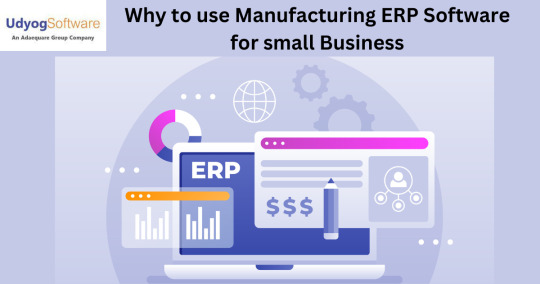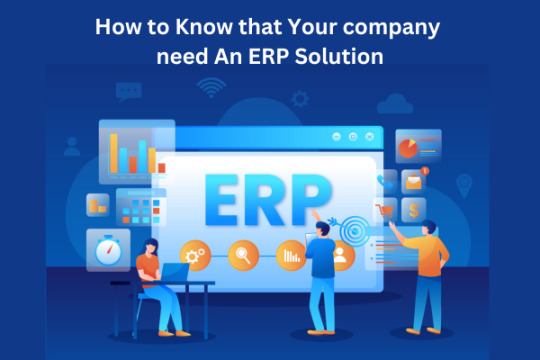Text
why to use Manufacturing ERP Software for Your Small Business

Using Manufacturing ERP (Enterprise Resource Planning) software can offer several significant advantages to small businesses in the manufacturing industry. Here are some compelling reasons why you should consider implementing ERP software for your small manufacturing business:
1. Streamlined Operations : ERP software integrates and automates various business processes, such as inventory management, production scheduling, and order processing. This streamlines your operations, reduces manual data entry, and minimizes errors, leading to increased efficiency.
2. Improved Inventory Management : ERP systems provide real-time visibility into your inventory levels. This helps in maintaining optimal stock levels, reducing excess inventory, and minimizing carrying costs.
3. Enhanced Planning and Scheduling : Manufacturing ERP software helps you better plan and schedule production activities. This ensures that you can meet customer demands on time and reduce production bottlenecks.
4. Cost Reduction : With accurate data and insights provided by ERP, you can identify cost-saving opportunities, optimize resource allocation, and reduce wastage. This can lead to cost reductions in various areas of your business.
5. Better Decision-Making : ERP systems provide data analytics and reporting tools, allowing you to make informed decisions based on real-time information. This is crucial for adapting to changing market conditions and making strategic choices.
6. Quality Control : ERP software often includes quality control modules that help you monitor and maintain product quality throughout the manufacturing process, reducing defects and improving customer satisfaction.
7. Compliance and Regulations : Many industries have specific regulations and compliance requirements. ERP systems can assist in managing these requirements and ensuring that your business remains compliant.
8. Scalability : As your small business grows, ERP software can scale with you. You can add additional features or modules to accommodate your evolving needs without a complete system overhaul.
9. Customer Satisfaction : ERP systems enable better customer relationship management by providing insights into customer preferences, order history, and delivery times. This can lead to improved customer service and satisfaction.
10. Data Security : ERP systems often have robust security features to protect your sensitive business data. This is particularly important in today's digital age, where data breaches can be costly and damaging to a company's reputation.
11. Competitive Advantage : Implementing ERP can give your small business a competitive edge by improving operational efficiency, reducing costs, and enabling faster responses to market changes.
12. Streamlined Financial Management : ERP software for small business includes financial modules that help manage accounts, financial reporting, and budgeting. This can simplify your financial processes and make it easier to track expenses and revenue.
In summary, manufacturing ERP software can be a valuable investment for small businesses in the manufacturing sector. It can help streamline operations, improve efficiency, reduce costs, and enhance overall competitiveness. When selecting an ERP system, make sure to choose one that aligns with your specific business needs and growth goals.
0 notes
Text
How to Know that Your company need An ERP Solution

Implementing an Enterprise Resource Planning (ERP) solution is a significant decision for any company. Here are some signs that indicate your company may need an ERP solution:
1. Data Duplication and Inaccuracy:
If you notice data being duplicated across various systems or departments, and data accuracy is becoming a concern, it's a sign that an integrated ERP system could help centralize data and maintain its consistency.
2. Difficulty in Decision-Making :
If your management team struggles to access real-time information and relies on outdated reports for decision-making, an ERP system can provide timely, accurate data through dashboards and reporting tools.
3. Growth and Expansion : As your company grows, managing various processes and data manually becomes increasingly complex. ERP systems are designed to scale with your business, making them suitable for growing companies.
4. Inefficient Processes : When your business processes are inefficient, resulting in wasted time and resources, an ERP can streamline workflows and automate repetitive tasks.
5. Inventory Management Challenges : Frequent stockouts, overstocking, or difficulty in tracking inventory movements can indicate a need for an ERP system with robust inventory management capabilities.
6. Customer Relationship Management (CRM) Issues : If your customer interactions are not well-coordinated or you struggle to provide personalized service, an erp software in india system with CRM functionality can help you manage customer data, sales, and service more effectively.
7. Compliance and Reporting Challenges : Industries with stringent regulatory requirements can benefit from ERP systems that help automate compliance tasks and generate audit-ready reports.
8. Complex Supply Chain : As your supply chain becomes more complex with multiple suppliers, distribution centers, and international operations, an ERP system can improve visibility and control.
9. Limited Mobility : If your employees need access to critical business data while on the go or working remotely, consider an ERP solution with mobile access capabilities.
10. High IT Costs : If maintaining multiple software applications and managing IT infrastructure is becoming expensive and time-consuming, consolidating your systems with an ERP can lead to cost savings.
11. Lack of Integration : If your current software applications do not integrate well with each other, leading to data silos and manual data transfer, an ERP system can provide seamless integration.
12. Difficulty in Forecasting : If you struggle with demand forecasting or managing production schedules, ERP systems can provide tools for better planning and resource allocation.
13. Customer and Supplier Demands : If customers or suppliers require you to have specific capabilities, such as EDI (Electronic Data Interchange) for electronic transactions, implementing an ERP system can meet these requirements.
14. High Employee Turnover : Frequent staff turnover and the need for extensive training can be reduced with an ERP system that offers user-friendly interfaces and standardized processes.
15. Competitive Pressure : If competitors in your industry are adopting Erp software for small business systems to gain efficiency and improve customer service, it may be a sign that your company should consider doing the same to remain competitive.
Before implementing an ERP solution, it's essential to conduct a thorough needs analysis, involve key stakeholders, and select the right ERP system that aligns with your company's goals and processes. ERP implementation can be complex and costly, so proper planning and a clear understanding of your organization's needs are critical for success.
0 notes
Text
Best ERP software
Enterprise Resource Planning (ERP) software is a comprehensive and integrated suite of business applications designed to support and automate various functions and processes within an organization. ERP software is used by businesses of all sizes and across various industries to manage and streamline their day-to-day operations and facilitate efficient decision-making. Here are the key components and functions of ERP software
Financial Management: ERP systems typically include modules for managing financial processes such as accounting, budgeting, financial reporting, and accounts payable and receivable. These modules help organizations track their financial health, manage expenses, and ensure compliance with accounting standards.
Human Resources (HR) Management: ERP software often includes HR modules that handle tasks like employee payroll, benefits administration, recruitment, time and attendance tracking, and employee performance management. These modules help organizations manage their workforce effectively.
Supply Chain Management (SCM): SCM modules within ERP software manage the end-to-end supply chain, including procurement, inventory management, order fulfillment, demand forecasting, and supplier management. This helps optimize inventory levels and streamline the procurement process.
Customer Relationship Management (CRM): CRM functionality allows organizations to manage customer information, sales leads, and marketing campaigns. It helps improve customer service, track sales opportunities, and enhance customer engagement.
Manufacturing and Production: ERP systems often include modules for manufacturing and production planning, scheduling, and execution. These modules help optimize manufacturing processes, monitor production efficiency, and ensure timely delivery of products.
Inventory Management: ERP software provides tools for tracking and managing inventory levels, reducing carrying costs, and minimizing stockouts or overstock situations.
Project Management: Some ERP systems offer project management modules that help organizations plan, execute, and monitor projects, including resource allocation, budgeting, and task management. use the erp software for small business
Analytics and Reporting: ERP software typically includes reporting and analytics tools that allow users to generate custom reports, analyze data, and gain insights into their business operations. These tools aid in decision-making and performance monitoring.
Compliance and Regulatory Reporting: ERP systems help organizations comply with industry-specific regulations and reporting requirements by providing tools to track and report on compliance-related data.
Integration: ERP software integrates various business processes and data sources into a centralized database, ensuring data consistency and eliminating the need for multiple standalone software applications.
Customization and Scalability: Many ERP systems allow for customization to adapt to an organization's specific needs. They are also designed to scale as a business grows, accommodating increased data volume and user requirements.
Cloud and On-Premises Deployment: ERP software can be deployed either on-premises or in the cloud, offering flexibility in choosing the deployment method that suits an organization's preferences and requirements.
Overall, ERP software serves as a central hub that connects various departments and functions within an organization, enabling data-driven decision-making, process optimization, and improved efficiency. It plays a crucial role in modern business operations, helping organizations manage their resources effectively and stay competitive in a rapidly changing business environment.
Are you looking for an Best ERP software solution to support your business's growth? Udyog software is renowned as India's leading ERP software provider, with a proven track record of success across various industries.
0 notes
Text
Listany is a top-notch eCommerce website development company specializing in providing eCommerce solutions tailored to various industries, including but not limited to restaurants, grocery stores, and retail businesses.
#ecommerce#marketing#ecommercedevelopment#digitalmarketing#ecommercebusiness#ecommercedevelopmentcompany#onlineshopping#website#seo#webdesign#ecommerceservices#ecommerceplatform#onlinebusiness#fashion#branding#ListAny#smallbusiness#socialmediamarketing#webdevelopment#shopping#onlinestore#onlineshop#ecommercewebsite
0 notes
Text
Are you looking for Best ERP solutions for your company or organization ? Udyogsoftware is one of the leading Best ERP software in india for various industries like chemical , pharma , manufacturing etc . For more details, get a demo today
1 note
·
View note